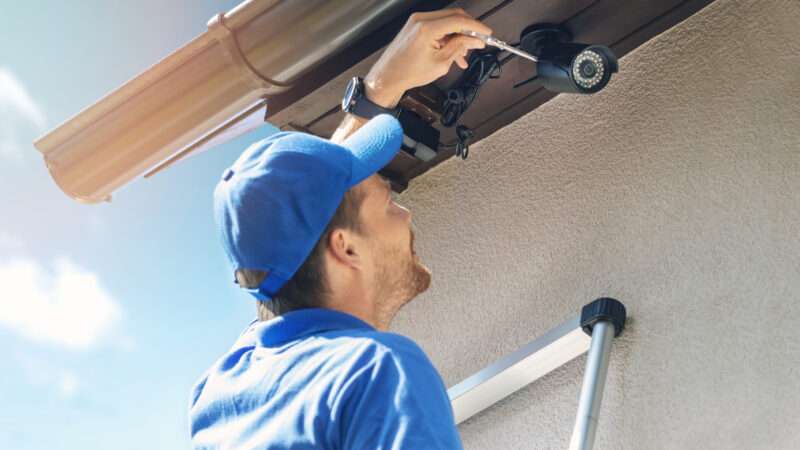
The term "surveillance state" brings certain images to mind: cameras on every corner, cataloging passersby's every move. What one may not always consider is that some of those cameras may have been put up by private citizens for nonpublic use.
In 2018, Amazon bought Ring, a company that manufactures video doorbells, cameras, and other home security equipment. At its acquisition, just a few years after failing to get an offer on ABC's Shark Tank, the company was valued at upward of a billion dollars. Ring's doorbells give consumers live video of any visitor to their home; the company's founder touts that its products prevent neighborhood crime.
To that end, Ring provides a companion app, Neighbors, which functions similarly to NextDoor. Customers can share camera footage or safety alerts with other nearby Ring users. Ring has also partnered with over 2,000 police departments across the country. Using the Neighbors app, police are able to request access to customers' video footage to aid in investigations.
Ring's website stresses that it is the customer's choice whether or not to turn over the footage in response to a request. But as it turns out, that may not always be true.
Earlier this month, The Verge reported that despite Ring's assurances, police can access users' stored footage without the customer's permission or even a warrant. The Law Enforcement Request form on Amazon's website even includes a bright red "Submit Emergency Request" button. While Ring's Terms of Service stipulate that it will only furnish content to law enforcement, for example, "if legally required to do so" or to "comply with applicable law, regulation, legal process or reasonable preservation request," Amazon's Law Enforcement Guidelines state that it "reserves the right to respond immediately to urgent law enforcement requests for information in cases involving a threat to public safety or risk of harm to any person."
In fact, in a July 1 response to questions from Sen. Ed Markey (D–Mass.), Amazon admitted that so far in 2022, "in response to an emergency request," Ring provided customer footage to law enforcement 11 times. Given the number of police agencies in the program, this is a fairly insubstantial percent of the total, but it's also only for a single year; the company did not provide totals for any previous year. And as the Electronic Frontier Foundation (EFF) pointed out, "there is no process for a judge or the device owner to determine whether there actually was an emergency."
Not to be outdone, San Francisco is taking things a step further. After the city recalled its progressive district attorney last month, Mayor London Breed appointed Brooke Jenkins as the interim replacement. Now, both Breed and Jenkins support a proposal to the Board of Supervisors that would give law enforcement real-time access to surveillance cameras, including those owned by individuals or businesses, like Ring or competitor Google Nest. SFGate reports that currently, local ordinance allows real-time access "only if there is a serious risk of physical injury or death." The new proposal would expand this field to "crimes such as retail theft, rioting, looting and drug-dealing."
This new ordinance is troubling enough without considering Ring's sheer growth: Since more cameras make its features more effective, Ring has given away free and discounted doorbells in cities across the country and advocated that law enforcement encourage citizens to purchase cameras. In Los Angeles, the company enlisted more than 100 police officers to hawk Ring products in exchange for free or discounted cameras. In Lakeland, Florida, Ring donated 15 doorbells for police to give away to residents for free in exchange for "Engag[ing] the Lakeland community with outreach efforts on the platform to encourage adoption of the platform/app." It additionally contributed $10 per Lakeland-area download of the Neighbors app toward the purchase of further Ring products for police to give away.
There would perhaps be some comfort if this burgeoning public-private panopticon were effective in reducing crime. Unfortunately, both scientific and anecdotal evidence says otherwise. Ring boasted of crime rate reductions between 20 percent and 55 percent in different areas of Los Angeles using its video doorbells. But an MIT Technology Review study was unable to replicate those findings, finding that the doorbells had little if any effect whatsoever. Additionally, officers have said that Ring users often tie up police resources with false-alarm reports.
An expanding network of cameras would be troubling enough if they were all simply self-contained and on private networks. The fact that police agencies are increasingly exerting control over the recordings and feeds of private cameras should alarm civil libertarians. As EFF wrote, "Once infrastructure exists, there will always be temptation for police to use it for less urgent situations."
The post Police Can Access Your Ring Camera Footage Without a Warrant appeared first on Reason.com.







